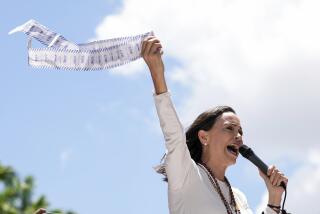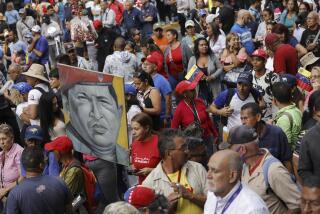Zimbabwe limits rallies before vote
- Share via
JOHANNESBURG, SOUTH AFRICA — The message from the campaign posters decking the streets of Zimbabwe’s capital is blunt: “Mugabe Is Right,” a reference to the president who has ruled for 28 years and seems loath to give up power.
With his rival, Morgan Tsvangirai, banned Friday from addressing political rallies in the run-up to the June 27 presidential runoff, there is doubt about whether the opposition will be allowed to even put up campaign posters.
Staff members with the opposition Movement for Democratic Change on Friday were editing an advertisement for the state-owned ZBC network, without knowing whether the channel would air it. The ad, with the slogan “Let’s Finish It,” features Zimbabweans talking about their despair over the situation in their country and promises “A new president ready to deliver a new Zimbabwe.”
After its crackdown aimed at the opposition and also at Western diplomats and aid organizations, analysts believe the regime is unlikely to step down if Mugabe loses the election. Tsvangirai supporters claim that their candidate won the first round of balloting in March, but the national election commission gave him 48% of the vote to Mugabe’s 43%, not enough to avoid a runoff.
The ban on Tsvangirai’s rallies was just the latest in a series of steps taken by the government to disrupt the opposition and others it perceives as critics.
Police briefly detained the opposition leader at a roadblock Friday for the second time in a week.
On Thursday, U.S. diplomats investigating political violence were pursued by police in a high-speed car chase and detained for six hours at a roadblock while Mugabe supporters menaced them.
The leader of a smaller opposition party, Arthur Mutambara, was arrested recently for an article critical of Mugabe.
And the regime Thursday banned international aid agencies from doing any fieldwork; it has accused them of supporting the opposition. About one-third of Zimbabwe’s population, about 4 million people, depends on the aid for survival amid an agricultural collapse blamed on the government’s mismanagement.
The European Union on Friday called on Zimbabwean authorities to allow aid agencies to operate freely, and UNICEF warned that 185,000 needy children would be denied assistance as a result of the ban.
The U.S. ambassador in Harare, James McGee, told journalists Friday that the government was using food as a political weapon, distributing it mainly to Mugabe supporters. McGee warned of the risk of massive hunger.
Human Rights Watch and other groups have reported that Mugabe’s regime has used food as a political weapon. Last year, a Times investigation found that police and ruling party officials in some villages were selling maize on the black market from their homes at high prices while villagers could get no maize from the government agency.
Zimbabwe’s maize is distributed solely by the government’s Grain Marketing Board, allowing for political manipulation of supplies.
Asked about the government’s ban on campaign rallies, opposition party spokesman George Sibotshiwe said by telephone that Zimbabwean authorities claimed the step was necessary because they could not guarantee Tsvangirai’s safety. Sibotshiwe dismissed the rationale.
“As long as there is a ban on one candidate’s rallies it will affect his ability to get to the people, in a big way,” he said, noting Tsvangirai had planned 16 rallies in Matabeleland, his stronghold in the south.
Sibotshiwe said the opposition party would know Monday whether state TV would broadcast MDC advertisements. There were fears the regime would bar any opposition ads.
“There can be no predictions when you’re dealing with a rogue regime,” he said.
But he said Tsvangirai remained upbeat.
“Despite the intimidation we are accessing the people in many different ways,” he said. “The sense on the ground is that Morgan Tsvangirai will win this election.”
--
More to Read
Sign up for Essential California
The most important California stories and recommendations in your inbox every morning.
You may occasionally receive promotional content from the Los Angeles Times.












